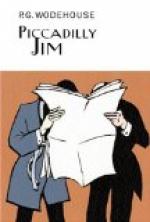And now, suddenly and unaccountably, the means was at hand for restoring her to her tranquil self-esteem. Jimmy Crocker, despite what his stepmother had said, probably in active defiance of her commands, had come to America after all. Mr. Pett’s first thought was that his wife would, as he expressed it to himself, be “tickled to death about this.” Scarcely waiting for the office-boy to retire, he leaped towards Jimmy like a gambolling lamb and slapped him on the back with every evidence of joy and friendliness.
“My dear boy!” he cried. “My dear boy! I’m delighted to see you!”
Jimmy was surprised, relieved, and pleased. He had not expected this warmth. A civil coldness had been the best he had looked for. He had been given to understand that in the Pett home he was regarded as the black sheep: and, while one may admit a black sheep into the fold, it does not follow that one must of necessity fawn upon him.
“You’re very kind,” he said, rather startled.
They inspected each other for a brief moment. Mr. Pett was thinking that Jimmy was a great improvement on the picture his imagination had drawn of him. He had looked for something tougher, something flashy and bloated. Jimmy, for his part, had taken an instant liking to the financier. He, too, had been misled by imagination. He had always supposed that these millionaires down Wall Street way were keen, aggressive fellows, with gimlet eyes and sharp tongues. On the boat he had only seen Mr. Pett from afar, and had had no means of estimating his character. He found him an agreeable little man.
“We had given up all hope of your coming,” said Mr. Pett.
A little manly penitence seemed to Jimmy to be in order.
“I never expected you would receive me like this. I thought I must have made myself rather unpopular.”
Mr. Pett buried the past with a gesture.
“When did you land?” he asked.
“This morning. On the Caronia . . .”
“Good passage?”
“Excellent.”




